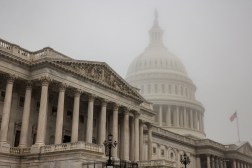Special committee calls for ‘reboot’ of federal technology accessibility oversight

The Department of Justice must “reboot” critical oversight of federal technology accessibility by resuming required biennial progress reports not issued since 2012, according to the Senate Special Committee on Aging’s Democrats.
Majority staff released its “Unlocking the Virtual Front Door” report, after an 11-month investigation that found the Department of Veterans Affairs committed hundreds of thousands of accessibility violations taking years to address due to insufficient oversight — a problem extending to other federal departments.
Congress added Section 508 to the Rehabilitation Act in 1986, mandating that federal technology be accessible to people with disabilities, and last strengthened the statute in 1998. But oversight and enforcement hasn’t kept pace with the U.S.’s aging population, 80.8 million people expected to be over 65 by 2040.
“The entire federal government needs to wake up to this issue because a whole-of-government approach is what we need to remedy it,” said committee chair Sen. Bob Casey, D-Penn., in a statement. “We would not ask someone using a wheelchair to walk up the courthouse steps, but we are doing something similar when we ask people with disabilities to use federal websites that are not accessible.”
Blind Air Force veteran Ron Biglin from Clarks Summit, Pennsylvania, can’t access the VA’s My HealtheVet website with the screen reader the department provided him, and the Centers for Disease Control and Prevention‘s website for COVID-19 prevalence data was no better, the committee’s majority staff found.
DOJ recently committed to resuming Section 508 progress reports, and the committee’s majority staff is recommending the General Services Administration begin publishing data on Section 508 compliance and inspectors general increase oversight of their agencies’ compliance.
“Increased oversight from inspectors general would likely result in improved accessibility for taxpayers and workers using federal technology,” reads the report. “Such oversight may also lead to cost savings, given that remediating non-compliant websites resulted in additional costs for departments and agencies.”
The report further recommends agencies like the VA maintain their ability to conduct automated Section 508 compliance scans, after the department cancelled a contract undermining that capability for a year.
Agencies should include people with disabilities and older adults in their technology planning and evaluation and consider using human testers to evaluate Section 508 compliance and technology accessibility, akin to the Department of Homeland Security‘s Trusted Tester program. Appointing accessibility officers, whose job it is to ensure Section 508 compliance within their agency, could also help, according to majority staff.
“Rather than locating Section 508 compliance among multiple offices, housing Section 508 compliance responsibilities within existing accessibility offices or creating offices whose responsibilities include oversight of Section 508 compliance could improve the accessibility of technology within these organizations,” reads the report.
The report also recommends agencies ensure Section 508 complaints can be filed and that Congress:
- consider updating the statute’s language to add accountability measures, grant the Access Board enforcement authority, allocate funding and evaluate complaint resolutions;
- have authorizing committees and spending bills hold other agencies accountable for Section 508 compliance; and
- ensure accessibility of its own technology and websites.
“Accessible technology is crucial for people seeking to secure health care, receive Social Security and VA benefits, pay taxes, and navigate federal information ranging from weather forecasts to economic data,” reads the report. “The COVID-19 pandemic increased the nation’s reliance on the internet to access basic services — driving home the importance of accessible federal websites and communications technology.”






